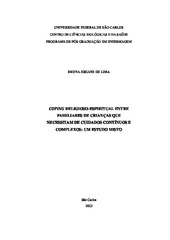Coping religioso-espiritual entre familiares de crianças que necessitam de cuidados contínuos e complexos: um estudo misto
Abstract
General objective: to analyze the use of spiritual-religious coping by family members of children who need continuous and complex care. Specific objectives: 1. Characterize family members and children who need continuous and complex care; 2. Measure the spiritual- religious coping of these family members; 3. Identify socio-demographic factors associated with spiritual-religious coping; 4. Knowing the experience of family members of children who need continuous and complex care regarding the practice of religiosity and spirituality. Method: this is a mixed sequential explanatory study carried out in a city in the interior of the state of São Paulo. Data collection was carried out between July and November 2022, in two subsequent stages. In the first stage, with a quantitative approach, family members responded to a socio-demographic characterization instrument and the abbreviated Religious- Spiritual Coping Scale. Afterwards, they were invited to answer an open question about the use of religiosity and spirituality. Quantitative data analysis was based on descriptive and analytical statistics, using the following tests: Mann-Whitney, Kruskal-Wallis, Spearman Correlation Coefficient and simple and multiple Linear Regression. The qualitative data analysis went through the steps recommended by the inductive thematic content analysis technique. The integration of the results of the two stages occurred in the discussion of the data. All ethical precepts for research involving human beings were respected. Results: 51 family members of 28 children who need continuous and complex care, with a mean age of 40.2 years, participated in the quantitative stage. In relation to religious-spiritual coping, family members used more positive strategies than negative strategies, 76.48% of family members indicated “high intensity” in the use of general coping strategies. The variables “family age” and “residents in the household” showed a statistically significant relationship with religious-spiritual coping. In the second stage, 15 family members participated and their testimonies enabled the construction of three thematic categories: “Believing in a God makes me stronger”: relief from suffering through faith in God; Transformation in the way of thinking, feeling and acting with others and with oneself and Gratitude to God and trust in divine purposes. Conclusion: in general, family members used positive religious-spiritual coping strategies more frequently, corroborating the qualitative testimonies, which revealed an experience marked by trust in God's plans and relief from suffering provided by faith. It is recommended that pediatric nurses consider the spiritual and religious needs of families when planning their actions.
Collections
The following license files are associated with this item:

